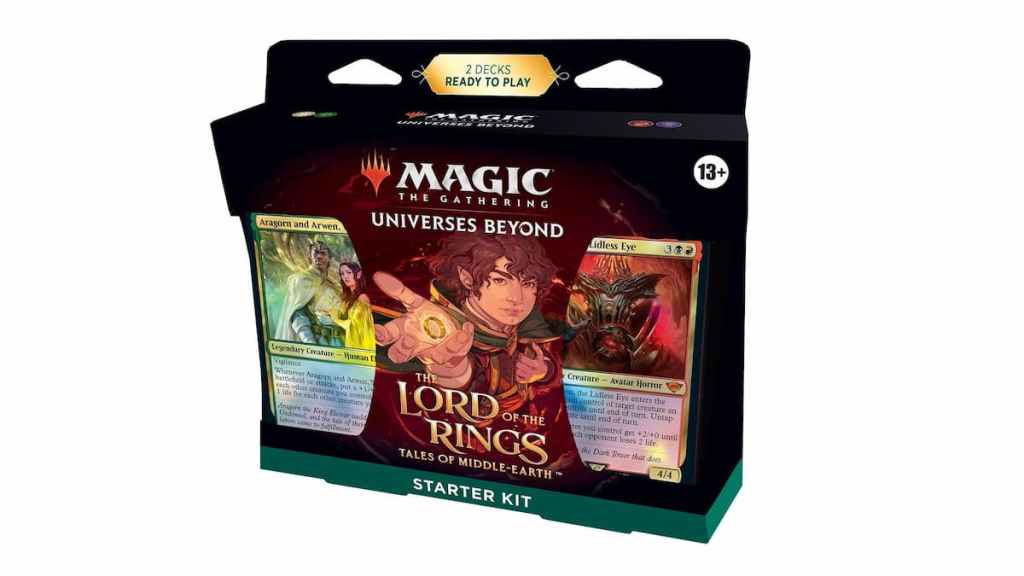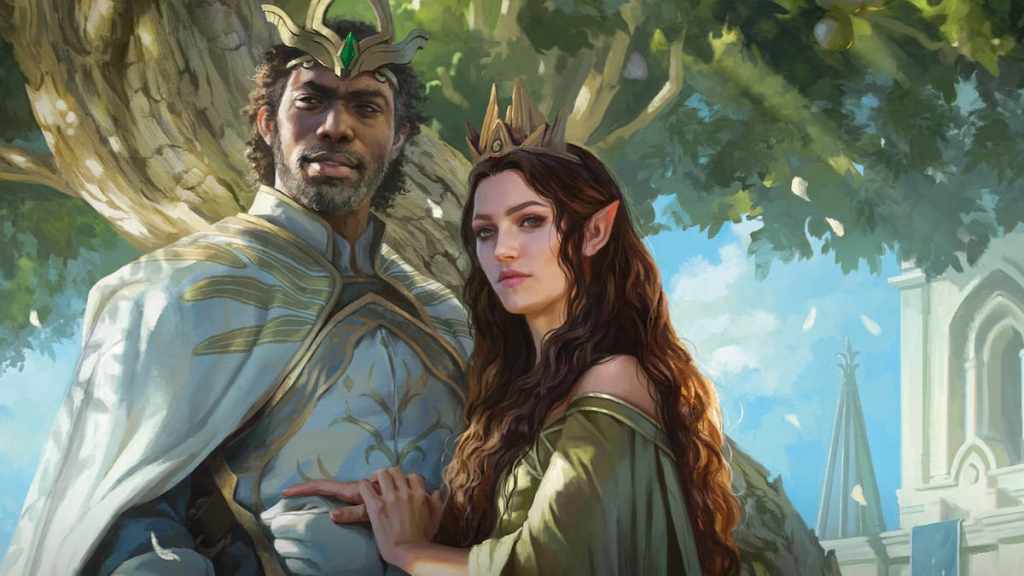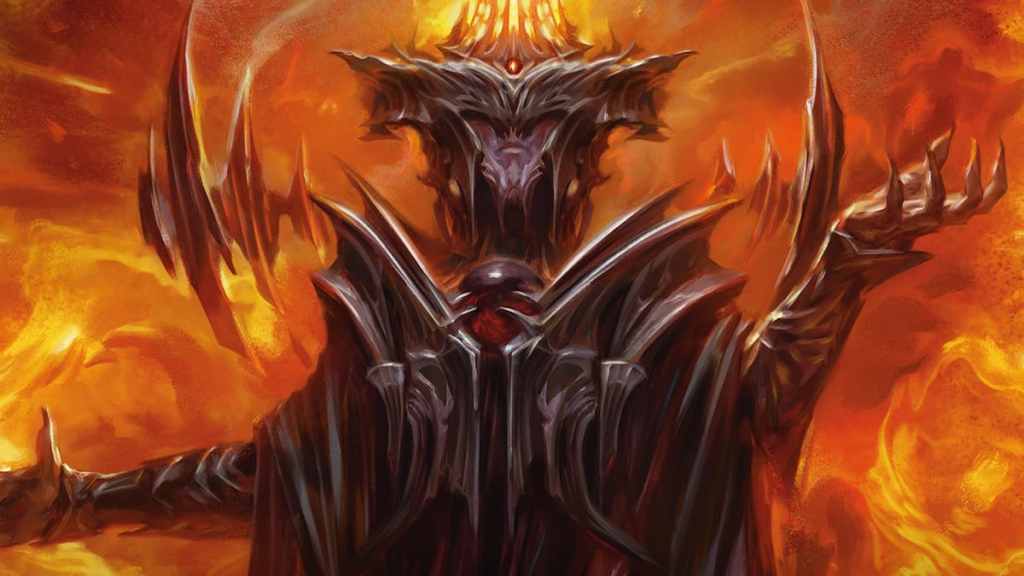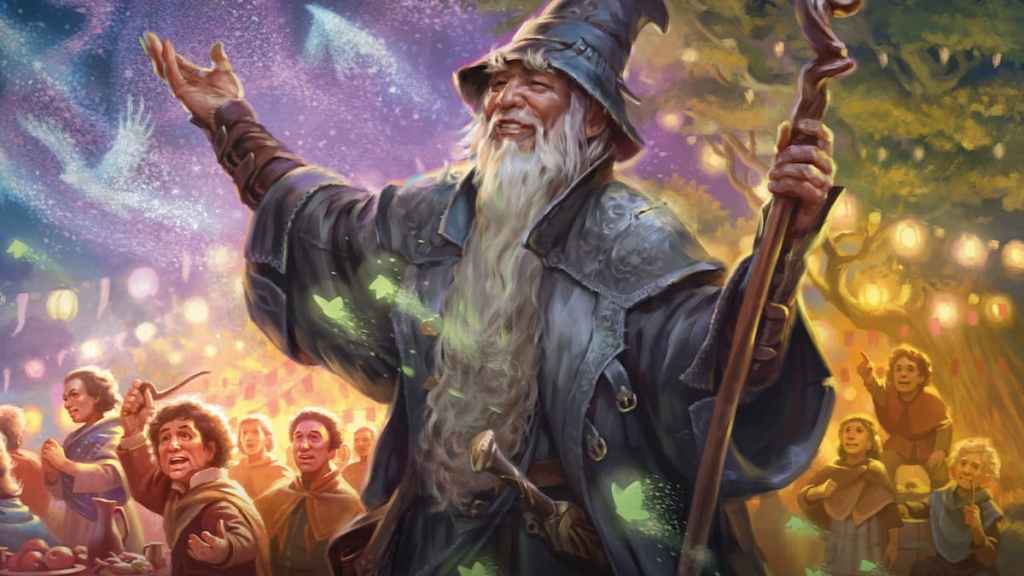
Magic: The Gathering has had several crossovers over the years, but The Lord of the Rings: Tales of Middle-earth is the first one that encompasses an entire set. This is intended to appeal to fans of The Lord of the Rings, which is why a Starter Kit has been released, giving new players the chance to learn Magic: The Gathering with familiar characters but with decks that are fun without being overwhelming.
The Starter Kit is a great entry point, especially in the face of so many other products that could be mistaken for beginners. The Lord of the Rings: Tales of Middle-earth Commander Decks or the Jumpstart packs are a better starting point than just randomly buying boosters, but they’re not ideal for total newbies to Magic: The Gathering.
Related: Bringing The Lord Of The Rings To Magic: The Gathering – Ovidio Cartagena Interview
What You Get In The Lord Of The Rings Starter Kit

The Starter Kit has two 60-card decks: Gondor: Green-White and Mordor: Black-Red. Each deck has one traditional foil mythic rare card (Aragorn & Arwen, Wed and Sauron, the Lidless Eye), 4 non-foil rares, and a card box. There is also a Magic Play Guide booklet explaining the rules, while each deck comes with a reference card explaining the phases of battle. The decks also have token cards for their respective mechanics (Food, Catapult Stone, Soldier, Orc Army, and Treasure.)
Those who want to use these decks online can do so, as the Starter Kit also comes with two codes for MTG Arena. Each code provides digital copies of the Gondor: White-Green and Mordor: Black-Red decks, allowing them to be used in competitive matches against other players worldwide or just thrown against bots in practice games.
How The Gondor: Green-White Deck Works

The Gondor: Green-White Deck focuses on generating Food tokens and using them to empower your troops and restore life throughout the game. The deck features a lot of famous heroes from The Lord of the Rings, including Aragorn, Arwen, Frodo, Gandalf, Galadriel, Merry, and Pippin. The deck doesn’t have all of the members of the Fellowship, with Boromir and Legolas notably absent despite having cards that match the color identity of the deck, but you’ll get a mixture of recognizable faces to use against the forces of Mordor.
The Food token mechanic is a core aspect of the deck. Whenever a Food token is generated, its owner can pay two mana to sacrifice it, restoring three life points. Cards like Meriadoc Brandybuck, Peregrin Took, and Butterbur, Bree Innkeeper are great for filling the battlefield with food, while creatures like Mushroom Watchdogs and Eastfarthing Farmer gain benefits from the number of Food tokens already on the field. It’s an easy mechanic to get your head around, fits the theme of a deck filled with hobbits, and is the better choice for new players. If you’re more experienced and showing someone else the rules, then you should take the Mordor deck and gradually introduce mechanics over the course of the game.
How The Mordor: Black-Red Starter Deck Works

The Mordor: Black-Red Deck uses the Amass mechanic to generate Orc Army tokens to the field, allowing you to create one ever-growing unit to throw at the enemy. The Sauron deck has several iconic villains, including Sauron, Gollum, the Balrog of Moria, and the Witch-King of Angmar. Sadly, it doesn’t feature any of the individual Nazgul cards from the main set, as they fit the theme in terms of the source material but not the mechanics of the deck.
The way the Amass mechanic works is that a card has it alongside a number, such as Amass 2. When this is used, you create a 2/2 Orc Army token. If Amass is used again, then the number gets added to the existing Orc Army’s stats, so a second use of Amass 2 would turn the existing creature into a 4/4 Orc Army token. It’s a simple mechanic on the surface, and it fits Sauron’s MO of using armies to fight and only rarely taking the field.
The Mordor deck is a little more complicated than the Gondor one because it uses more varied keywords, such as Deathtouch, Flying, Trample, and Menace. The deck also has a lot of removal options, and knowing when to use them takes a little more experience with the game.
Is The Lord Of The Rings Starter Kit A Good Choice For Beginners?

The Starter Kit is excellent, but there are some ways in which it could have been improved. The Play Guide features an excellent overview of the rules and how to play the game, but it could have used a printed glossary for all of the keywords rather than just offering a QR code link to an online resource. It’s not a given that most people will always have phones & Internet access, and an extra page with all the relevant keywords and meanings would have been helpful.
There is one notable absence from the Starter Kit, and it’s the One Ring itself. The Tales of Middle-earth set introduced a major mechanic, where the player had to declare a Ring-Bearer, who became more powerful over the course of the game, whenever a card with the keyword “The Ring Tempts You” is played. This mechanic might have been deemed too confusing for the Starter Kit, but it’s a shame that such an essential part of the source material isn’t here for beginners.
Related: MTG: Has Someone Found The One Ring (1 of 1 Ring) Card & All Bounties
The two decks in the Starter Kit are a great way to introduce new players to Magic: The Gathering, especially if they’re fans of The Lord of the Rings. The decks are well-balanced against each other, fun to play, and filled with recognizable characters. If you want to get into Magic: The Gathering, you can’t go wrong with this set.
Final Score:
9/ 10
| + A great way to introduce Lord of the Rings fans to Magic | |
| + Decks are simple, balanced, and provide challenging battles against each other. | |
| + The artwork & presentation are gorgeous across the board. | |
| – The Ring Tempts You mechanic from the main set is absent | |
| – A printed glossary of the keywords would have been convenient. | |
| – Boromir and Legolas are missing, despite their cards fitting the color theme of the Gondor deck. |
from Gamepur https://ift.tt/pvXlAJB